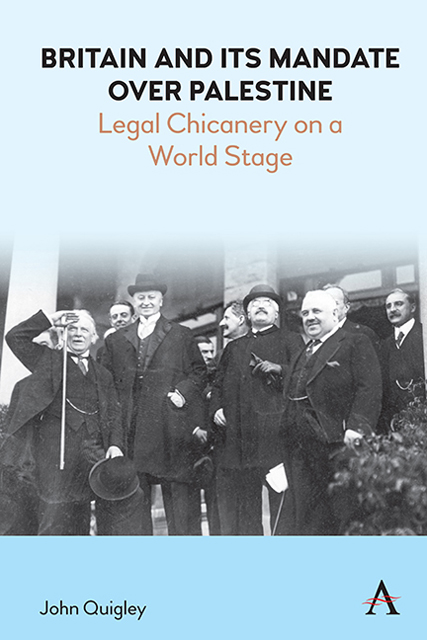Book contents
- Frontmatter
- Contents
- Preface
- Setting the Stage: Was Britain’s Rule in Palestine Legal?
- 1 The Balfour Declaration Is the Focal Point for the Legal Situation of Palestine
- 2 The Balfour Declaration Was a Binding Commitment to the Jewish People
- 3 The Jewish National Home Meant a Jewish State
- 4 The Balfour Declaration Was Issued to Affirm Jewish Rights in Palestine
- 5 The Paris Peace Conference Raised Jewish Statehood to the International Level
- 6 Britain’s Allies Made the Balfour Declaration an International Commitment
- 7 Britain’s Allies Endorsed Jewish Rights
- 8 Britain Took on Palestine Because of the League’s Mandate System
- 9 The League of Nations Protected Palestine’s Arab Population
- 10 Britain Was Given Palestine by the League of Nations
- 11 The League of Nations Put the Palestine Mandate into Legal Force
- 12 The Peace Treaty with Turkey Legalized Britain’s Status in Palestine
- 13 The Palestine Mandate Document Was a Treaty between Britain and the League
- 14 The League of Nations Required Britain to Implement the Balfour Declaration
- 15 The Palestine Mandate Document Implemented the League Covenant
- 16 The Palestine Mandate Document Recognized Jews as a National Group
- 17 The Palestine Mandate Document Bound Britain to the Balfour Declaration
- 18 The International Community Committed Itself to the Balfour Declaration
- 19 Britain Held Legal Status in Palestine
- 20 The United Nations Charter Carried Forward a Jewish Entitlement to Statehood
- Postscript: Why History Matters
- Documents Annex
- Notes
- Bibliography
- Index
8 - Britain Took on Palestine Because of the League’s Mandate System
Published online by Cambridge University Press: 10 January 2023
- Frontmatter
- Contents
- Preface
- Setting the Stage: Was Britain’s Rule in Palestine Legal?
- 1 The Balfour Declaration Is the Focal Point for the Legal Situation of Palestine
- 2 The Balfour Declaration Was a Binding Commitment to the Jewish People
- 3 The Jewish National Home Meant a Jewish State
- 4 The Balfour Declaration Was Issued to Affirm Jewish Rights in Palestine
- 5 The Paris Peace Conference Raised Jewish Statehood to the International Level
- 6 Britain’s Allies Made the Balfour Declaration an International Commitment
- 7 Britain’s Allies Endorsed Jewish Rights
- 8 Britain Took on Palestine Because of the League’s Mandate System
- 9 The League of Nations Protected Palestine’s Arab Population
- 10 Britain Was Given Palestine by the League of Nations
- 11 The League of Nations Put the Palestine Mandate into Legal Force
- 12 The Peace Treaty with Turkey Legalized Britain’s Status in Palestine
- 13 The Palestine Mandate Document Was a Treaty between Britain and the League
- 14 The League of Nations Required Britain to Implement the Balfour Declaration
- 15 The Palestine Mandate Document Implemented the League Covenant
- 16 The Palestine Mandate Document Recognized Jews as a National Group
- 17 The Palestine Mandate Document Bound Britain to the Balfour Declaration
- 18 The International Community Committed Itself to the Balfour Declaration
- 19 Britain Held Legal Status in Palestine
- 20 The United Nations Charter Carried Forward a Jewish Entitlement to Statehood
- Postscript: Why History Matters
- Documents Annex
- Notes
- Bibliography
- Index
Summary
“After the victory of the Allied Powers in World War I—and pursuant to Article 22 of the Covenant of the League of Nations,” wrote Yoram Dinstein, “the former Turkish territories in the Middle East were placed under the Mandates system. Palestine was assigned as a Mandate to Britain.” Per the Narrative, in line with Dinstein's claim, Britain's assumption of a governance role in Palestine came about because of the League's mandate system and through an assignment of Palestine to Britain.
Dinstein's statement conflated two separate issues. One is Britain's right to rule Palestine. The other is the mandate system. The mandate system was not a route to gaining a right to rule territory. It could be used only by a state that held sovereignty over the territory it wanted to place under mandate. Dinstein's wording, however, implied that Britain gained the right to govern through the mandate system.
The League Covenant did, to be sure, suggest that it was desirable that Turkey's Arab provinces, once under new sovereignty, should be administered as mandates rather than as colonies. But the League did not “place” territories under the mandate system. The League had no power to require any state that was holding territory to opt for the mandate system. The League of Nations had no role in determining which states would take on mandates. Nor, as we saw in Chapters 6 and 7, did the Allies have standing to “place” Palestine under Britain's control.
The decision to bring the mandate system into play for Palestine was made by Britain alone. As the San Remo meeting ended, Britain finished a draft of a peace treaty under which it would gain sovereignty from Turkey. The Supreme Council handed the draft to Turkey on May 11, hoping for an immediate signature. Turkey asked for time to respond. Britain was being pressed by the Zionist Organization to “regularize” its tenure in Palestine. From the time the guns of war fell silent, the Zionist Organization lobbied Britain to take practical steps in Palestine that would lead to Jewish statehood. From April 1918, Britain sponsored what was called the Zionist Commission, made up of Zionists from Europe.
- Type
- Chapter
- Information
- Britain and its Mandate over PalestineLegal Chicanery on a World Stage, pp. 51 - 58Publisher: Anthem PressPrint publication year: 2022



